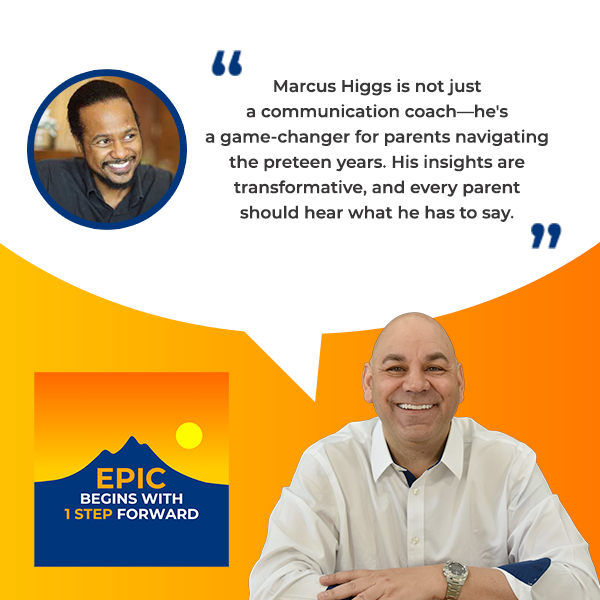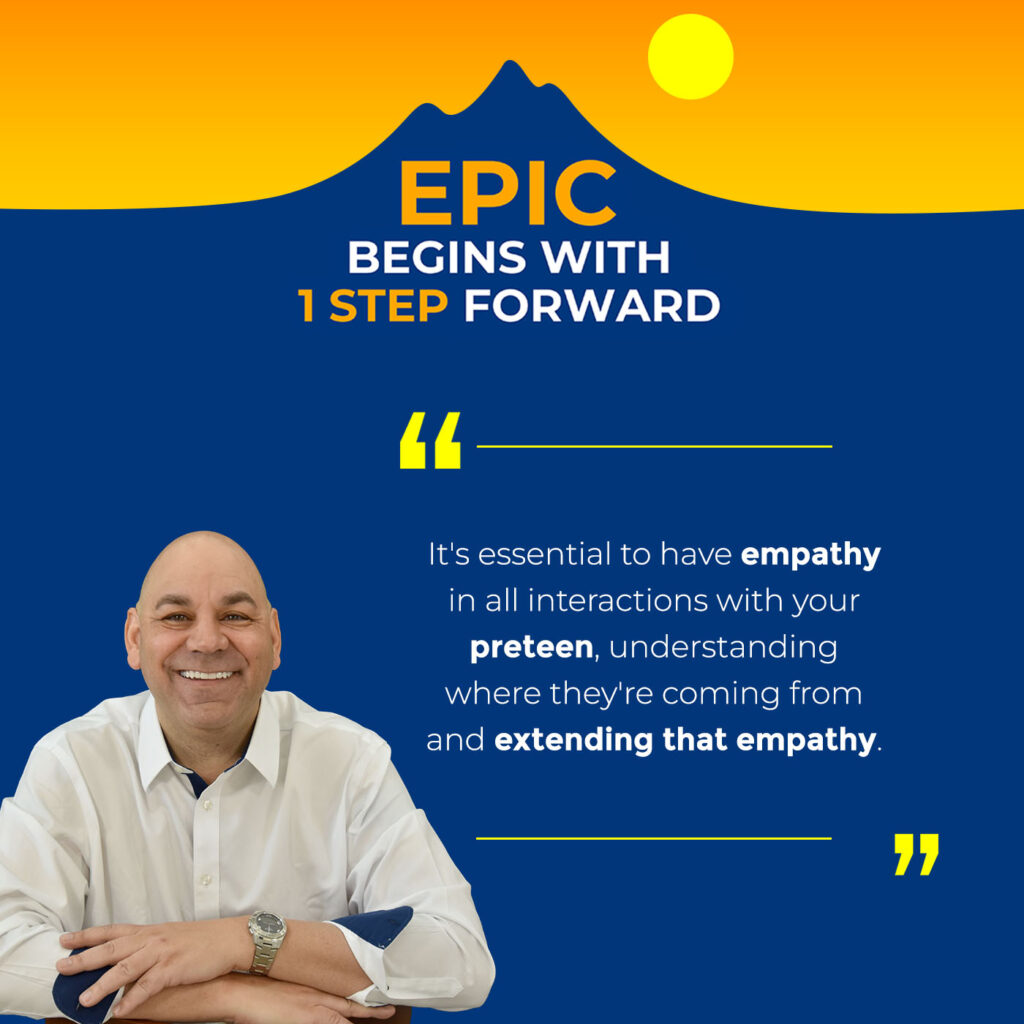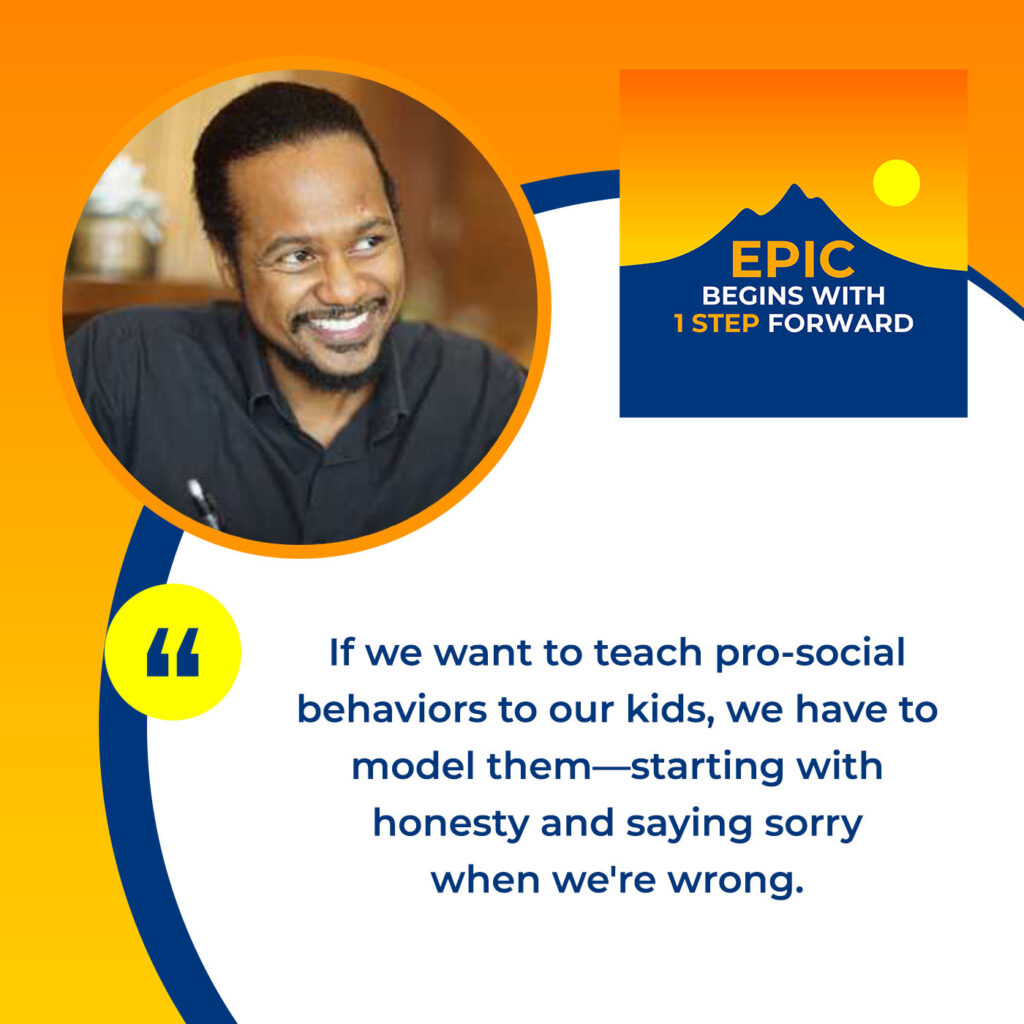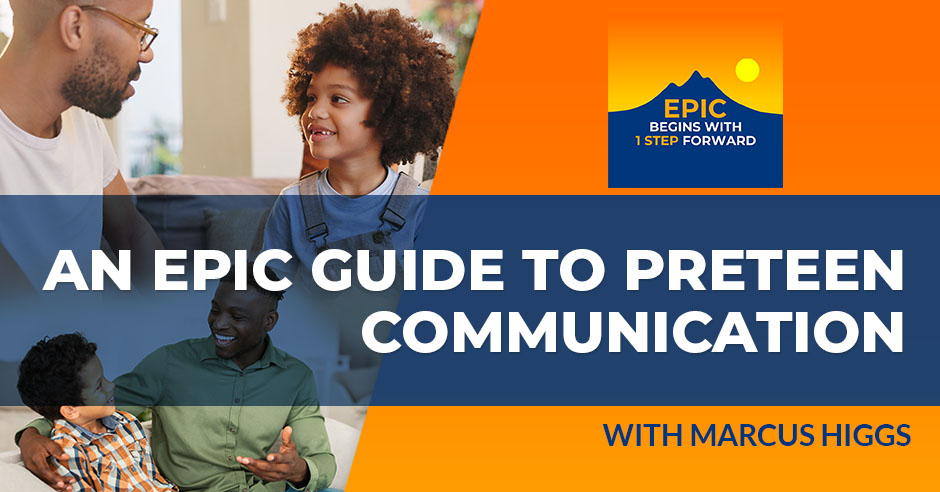Ever wondered how to bridge the communication gap with your preteen? In this engaging and insightful episode, we sit down with Marcus Higgs, a specialist in preteen communication, to explore the challenges and opportunities parents face during these formative years. Marcus shares practical tips and expert advice on how to foster open, supportive, and effective communication with your child. Join us for an EPIC conversation that will equip you with the tools to navigate this crucial stage in your child’s development, helping you build a stronger, more understanding relationship.
—
Watch the episode here
Listen to the podcast here
An EPIC Guide To Preteen Communication With Marcus Higgs
Welcome back to another exciting episode. I am so honored to be joined by Marcus Higgs, and I’m telling you, this is going to be an interesting one. Marcus, tell us a little about who you are and what you do.
Marcus Higgs: Communication Coach For Preteens
Zander, it’s wonderful to be here. I’m Marcus Aurelius Higgs. I’m a Communication Coach for parents of two teens, and I help parents open up communication between them and their kids during this specific formative time of the year when they’re transitioning from dependence into independence, establishing that character they’re trying to figure out and find, and helping parents do that through communication, knowing the specific challenges of this time, of this age, and how we might meet those challenges.
Open communication with your preteen isn’t just a nice-to-have—it’s essential for their journey to independence.
The first question I have is, how did you get into talking about preteens? It’s so wonderfully specific and so important. It seems random. How did you get there?
There are many different ways in which we can get to the end. I’ll mention three brief ways, and then I’ll tell you the origin story, if you will. I used to be in the classroom as an international school teacher, teaching grade 12 and grade 9, and then I got to teach grade 5 for half a year while my friend was on maternity leave. I wanted to answer the question, first, how can we teach grade 9 to write the greatest story ever told? That’s where you’re the author, the audience, and the actors on the stage, all the same. How do you live a good life?
Resilience And Expansion During Middle School Transition
My name is Marcus Aurelius, so I often answer that question. Second, I wanted to answer the mental well-being question. What’s up with this crisis? These fifth graders were awesome, and they were coming into middle school. How do we safeguard them, or how do we prepare them so that they can be, one word is resilient, but also expansive? They can understand who they are and then expand into this world. I grew up as a third-culture kid. That means, are you familiar with the term, or should I explain it to the audience?

Please explain it to the audience.
It’s where your passport doesn’t necessarily match your birth country, or that of your parents, or your upbringing. Oftentimes, these are international school students. My mother was from the Philippines. My dad was from the Bahamas. I grew up in America. I also grew up in the Bahamas. You’re answering questions of identity and who you are. While I say this is unique to me, this is the human experience.
This is a shared human experience. I studied communication journalism in Alabama at Hood University before going off to be a missionary in South Korea. My understanding of the divine expanded, and that is very much a part of me. That’s why I don’t hide it. I’m BYOB, bring your own beliefs, like I can get with everybody. I studied Islam as a world religion in Saudi Arabia when I taught there. I lived in Thailand and Spain, Eastern traditions and people are interesting. I love people, really, honestly. I don’t love your kids as much as you do. That’s why I came out of the classroom. I still support my parents because it’s a skill that I have. I’m still an educator. I just changed my audience so I could do it at scale.
That is certainly interesting. When your profile came up, one of the things that was interesting was that I’m a licensed professional clinical counselor, and I did all of my internship hours counseling middle school and high school students. When you’re talking about those fifth and sixth graders and that transitional time and them being resilient, I certainly talked a lot about and showed their resilience to my clients where I talked about, “You’re really resilient.” They would say, “No, I’m not,” and I’d say, “No, really, you are.” I got a real firsthand view of those challenges. I certainly remember the challenges I had in 5th and 6th grade, 9th grade, all of that. I was like, “That’s interesting.”
What’s interesting, I’ll start going.
Getting to witness some of that transition of starting to feel for the independence and frustration with the parents, some of which, as a parent myself, I’ll admit, there were times when it was really hard not to laugh at the sixth grader who was upset that their parent wasn’t going to let them stay out until 2:00 in the morning to hang out with older kids. I’m like, “Sorry, but I’m just going to have to say your parents are looking out for your betterment.”
I was going to say, and actually just that point, one metaphor is that kids are like gears turning. When you look at 6th, 7th, 8th grade middle school, some of them can be as tall as this and as short as this. They haven’t reached their growth spurt yet. They’re gears that don’t reach each other. It’s all this mismatch.
They’re obviously the people whose upbringing and stuff is such that some are more mature and some are more immature in terms of whether we want to call it worldliness, frankly, awareness outside of themselves.
Challenges Of Preteens During The Transition To Independence
It is truly diverse. It’s learning how to get in where you fit in while understanding yourself, while trying to understand the system while having so many expectations of you.
That’s why they cocoon to actually try to process this stuff because they’re also highly stimulated by nature, which is actually a benefit. It’s a feature, not a bug because life is trying to push them out of the nest. Quite literally, birds do that. They take away the downing in the nest so that the spikes will expose themselves, so the birds will jump out. Nature is doing that from the inside out.
What’s interesting about this epic journey that they’re on is being a history major, I always look at and go, let’s remember the past and let’s have perspective and stuff. If we take a really long view, the age at which you’re in 5th, 6th, 7th grade, from an incredibly long historical standpoint, was when you became a man or a woman. There were tests that happened. You were brought in to be able to do things. If you were in a hunter-gatherer culture, you might be able to go out on the hunts.
In fact, when life expectancy was like 40, you might get married and start to have children and stuff. We look at it and say, “They’re only twelve. They’re so young.” We’ve got eight more years before we even begin to think about pushing them out of the nest and stuff. It’s just this interesting historical perspective. Obviously, there are many places in the world where, when you are at that age, you are being treated more like an adult than we are here in the United States.
Actually, in Bruce Perry’s book What Happened to You with Oprah, he was speaking about how, because we don’t have that rite of passage anymore, I don’t want to say mess with, but people can’t find their identity so easily because there was that delineation of something else. What are you? We don’t have that rite of passage anymore. Kids are just drifting through, and it creates a failure to launch, if you will, or not knowing who they are.
I’ll sit there. I don’t like to think of myself as old, but I do sometimes have to go. The reference I’m giving is from last century and doesn’t. For me, that rite of passage was getting your driver’s license. It was this big thing. Yet I had high school students who would talk about something. I’m like, my bad for making an assumption, but here’s a seventeen-year-old. I’m like, “Can’t you drive yourself?” “No, I don’t have my driver’s license.” “Are you going to get one?” “No. I can take an Uber or Lyft wherever.” I’m like, “Although that is somewhat true, let’s look into the future machine. You go to college, you have your first job, and perhaps they send you to Wisconsin. They’re not going to pay for you to Uber around for your job when they could have you rent a car for $100 for the time that you’re there. They’re not going to pay $100 in Ubers.”
Advice For Parents Of Preteens
By the way, Uber isn’t everywhere. I was like, “Perhaps you’d like to have a license. It’s just a helpful piece of plastic to have for so many reasons, identifying you. Something comes up and you have to drive a car in an emergency.” Anyway, so that rite of passage doesn’t seem to be there. You’re right. We don’t have these bigger rites of passage. We’re having a great time here, Marcus. Question for you. What would be a couple of pieces of advice that you would share with parents who might have children coming up to, or in this timeframe, an epic message of communication?
I always say I don’t give advice unless I’m asked directly.
There’s got to be some stuff.
You asked me. This will be more general because it has to be relevant to what a person’s going through. In a general sense, your child is going to be searching for their understanding of what this world means. This is a developmental window between I work between 10 and 14. Everything that you’ve done before then, your words have been gospel. That is to say, black and white, it’s been the truth. You are the law, you are the manager, and so on.
You’re now shifting into a role as a coach, in which the approach of parenting I do is autonomy-supportive parenting. That means helping them find themselves and supporting them there while slowly removing yourself. In doing that, they’re going to look to other sources for what might be true. They’re going to be skeptical of you. They’re going to be skeptical of other people, and then some people they’re going to lean more into and others are not. It’s not personal. It’s not permanent.
Our job as parents isn’t to control our children, but to guide them as they discover their own identity and place in the world.
They are going to form their own understanding. There are communication approaches to help walk them through their thoughts. To help you on this epic journey, understand that sometimes parenting is beyond a marathon. They say it’s not a sprint. It’s a marathon. It’s beyond a marathon. Their personalities will change over time. What you’re there to do, in my understanding of what parenting is, is the etymology, the root of the word, which means to bring forth. You create the context for their expression to happen. That doesn’t mean everything is permissible, but you still set up boundaries and rules under which that happens.
Parenting isn’t about perfection. It’s about creating a safe space for your child’s expression while setting the right boundaries.
You keep them safe, which is a parent’s job. You also allow that expression to happen. We’re going to talk about what that expression is. We’re going to have conversations about it. That’s what I would say. Not only that expansion there in that safe space but also beyond the safe space because, eventually, that’s what it’s going to get to.
When you speak of resilience, resilience is the stress coming in to hit the system. I also believe that we, as the system, are meant to expand beyond that, and you will meet stress as you expand. How do you do that? How do you teach that to a kid? That only comes from speaking directly to their identity. The show-up framework that I teach it starts with a strong identity.
Obviously, keeping in mind that again, I keep calling it an epic journey because it really is.
It is.
For me, epic is every pilgrimage that includes commitment. Trying on different hats as young adults do as they’re transitioning is part of that pilgrimage. What fits? I know I saw in my children, my two daughters, but also in the students I was helping, that even throughout a school year, they were really into goth. That changed.
Challenges Of Changing Preteen Identities
They were into theater. They were trying that on, and they were trying on these different identities. As a parent, it can be challenging to, as you said, support and set boundaries. The question is, what are those appropriate boundaries? Do you give them enough room to be who they’re becoming? Whether you like who they’re becoming or not, that’s actually not the point.
If you talk to my mom, I’m sure there were some years where she might’ve said, “I really love him, but I’m not sure I like him so much today.” Way before this, I taught sailing, and I was always amazed at these delightful young people who, one summer, I’m like, “This person, Marcus, is so great.” The next summer, you come back, and I’m not as enthralled with the attitude I’m getting, the eye-rolling, all of that. I also try and remind myself that I, too, went through that.
It’s unfair for me to apply a standard that I wouldn’t apply to myself or didn’t want applied to me. I think that’s really essential for parents. Remember when you get upset that you find your kid is, I don’t know, trying out being a goth or listening to death metal or whatever. Did you do that? Did you want the chance to also do that? There are bigger things that I try and, again, I end up talking to lots of parents and stuff.
I’d be like, one parent was upset because they had caught their kid smoking a cigarette. I’m not advocating for smoking, but I’m like, did you perhaps at twelve try a cigarette? Where’s the difference? There are things that kids do that they shouldn’t do, but again, Marcus, you and I, we’re boys, we’re men, but we’re boys. As I told my daughters, boys are dumb, we’re all dumb.
Boys between 10 and 20 are especially extremely dumb. I demonstrated that for them because they’re like, “What do you mean?” I’m like, “All right.” I went to YouTube, and I literally did this searching, people hurting themselves. I pulled up a five-minute video, which was just clips of people crashing on skateboards, skiing, and all of this. The five-minute video, and we got done.
I said, “How many women were in them?” There were 1 or 2. I said, “Boys are dumb.” I said, “Here’s how we think, Marcus. Wouldn’t it be great to ride our bike off the roof? Let’s go.” It’s only when someone’s lying there with their ankle in a direction it shouldn’t be, when someone goes, “We could get hurt.” My daughter’s like, “How didn’t you think about getting hurt?” I’m like, “That’s the difference between the boys and the girls.”
The girls take it one or two steps further. Doesn’t mean that they’re not making bad decisions, but boys make incredibly bad decisions. I said, “I did all kinds of crazy stuff.” The fact that I’m here, it’s honestly a miracle. We didn’t have bike helmets. I did crazy stuff. I jumped off of a shed with an umbrella. I’m getting a parachute.
It’s so funny because I’ve done it.
I say it and you’re laughing because you’re like, maybe not exactly that. You look back and go, how am I not maimed or paralyzed? My point for the parents out there is to try to keep their perspective of what they did and what they wanted. It doesn’t mean that you don’t say, “No, I’m not going to let you do that.” I grew up in the seventies. You didn’t really wear seatbelts. I did stuff like put my hand out the car, put half my body out the car to see what it felt like.
Understanding And Empathy In Parenting
What I hear you saying is empathy. Always, in all interactions, have empathy. If you understand where it’s coming from, that even extends your empathy, if you will.

Keep in mind that there is a huge transition, that the child you knew and loved is changing as a person. We all change. Keep in mind that change in general is not easy sometimes. There’s all kinds of stuff.
Change is always effortful.
Puberty brings all crazy stuff.
The kids are probably smoking, and I’d say probably because there has to be, again, there’s no meaning without context. I’d need more of the context. Kids at that age are sensation-seeking. They’re testing boundaries. They’re seeing what they can get away with. They heard something, and they were going to say, “Let me try something.”
One thing they teach us in communication is there will always be conflict. What conflict is just two differing wants? That’s all conflict is. Sometimes, the two different wants are within yourself. Sometimes, they’re outside. You don’t want your kid smoking. You want well-being. Your kid wants to try something else. There’s nothing wrong with conflict because all relationships have conflict. What matters is how we deal with it and what conversation we have after it.
What sense do we make? What processing? How do we hold them in dignity while still communicating with them the value of taking care of themselves without being preachy? Again, there are frameworks to help with all this in your communication. There are ways to manage it. It’s not easy. Don’t think me saying it on the other side of the screen is saying it’s easy. There are frameworks that help make its execution easier.
I also think some honesty with your kids and acknowledging that it can be a challenging time, that your communication has been challenging. That you, too, as a parent, are at times struggling a little. Talking about what you want. I’m lucky I have really open communication with my daughters. As they were going through stuff, I’m like, “I understand that you want to do this and think that I’m being restrictive. From my perspective, I want to protect you. I want you to be safe. I also understand that you want the freedom to do stuff. I want you to have that.”
I just need to do my part, and I may fail or come back and say, “Parents, don’t say this enough. say you’re sorry.” We expect our kids to say sorry when they hurt us. As a parent, you have to come and say, “I am sorry. I was angry. I was scared. I was whatever.” I think that fosters the idea that it is a safe environment for your child to say, “I’m confused” or “I don’t know.”
All healthy growth starts from the truth. You have to start with the truth. If you don’t say, “I’m sorry,” then we’re always going to think, “I have to be perfect. When I’m not the fullness or perfect of it, I have to hide it.” If we want to teach our kids these prosocial behaviors, we have to model them. That’s what we’re trying to do.

Sorry is saying, “I did something that wasn’t in alignment with who I want to be. I’m making it right. This is what I decided to do going forward.” That’s what healthy growth is.
I’m going to try. I may fail again, but I understand, and I am aware. Also, in a respectful way, you, too can remind me when I’m straying from that goal. I think that’s important because parents are like, “I’ve got to get it right.” There’s no instruction. The only time your child is perfect is in the first two seconds they’re born. We just start to chip away at it with bad decisions.
When parenting feels overwhelming, remember—there’s no instruction manual, but there is resilience and the will to keep trying.
I hold a different perspective, or may I share a different perspective? I 100% agree that you’re born in your fullness. I believe you continue in your fullness. It’s just that your attention and awareness are brought away. It’s compounded by the minutiae and BDS, bad stuff stories that we pile on top of it.
I’m not implying that as parents in general, but what I’m saying is that there is no instruction manual. Everyone makes mistakes. No one is perfect. Keep in mind as a parent that just because your child was such an angel at 5, at 12, there may be a little more testing of the boundaries. They may throw some attitude towards you. In general, everyone understands and has that open communication, again, I want my daughters to talk to me about what’s going on. That can only happen if they feel that it’s safe to do so.
The Role Of Psychological Safety In Parenting
That’s one definition of psychological safety. It means the ability to be authentically myself without fear of threat. If I can be me without fear of threat, then I may say some things that will rub you the wrong way. Rumi says if we assume we run away from everything that rubs us the wrong way, it’s when we understand that there’s the rub, like, sorry, I was an English teacher, but that’s what Shakespeare said. The rub in Hamlet. That’s what the rub is. Don’t run away from it. It is part of the growth. That’s why it’s called growing pains. When you understand that, you can better manage it.
Believe it or not, our time is coming to an end here, Marcus. Hard to believe, so much fun. How can parents who are like, “I need what Marcus has,” get ahold of you?
How To Reach Marcus Higgs
MarcusHiggs.com. That’s where I am. I have some workshops that I’m posting soon. They should be there by the time this is published. You can reach out on LinkedIn. I’m not so much on other social networks. If you meet me there, you’ll see what I’m putting out.
Marcus, I want to thank you, truly an epic conversation. So much information, so helpful. Thank you so very much.
It’s been a pleasure.
I want to remind everyone that you can go to EpicBegins.com to find all the information you need for your epic journey and always remember that epic choices lead to the epic life that you want.
Important Links
- Marcus Higgs
- LinkedIn – Marcus Higgs
About Marcus Higgs
 Marcus is a communication coach for parents of preteens (ages 10-14). He helps them show up and maintain a meaningful relationship with their child during these crucial formative years. He works with parents who value doing hard things and want to connect with their tween before it’s too late to bridge the gap. With a multicultural background himself—born to a Filipino mother and a Bahamian father—Marcus finds particular joy in supporting families to communicate across generational and cultural divides. His own diverse upbringing, coupled with over a decade and a half of international experience across East Asia, Europe, Southeast Asia, the Middle East, and South America, has given him unique insights into cross-cultural communication. Now he’s on a mission to mend parent-child relationships through effective communication globally and shared storytelling using ‘The SHOW UP Framework’.
Marcus is a communication coach for parents of preteens (ages 10-14). He helps them show up and maintain a meaningful relationship with their child during these crucial formative years. He works with parents who value doing hard things and want to connect with their tween before it’s too late to bridge the gap. With a multicultural background himself—born to a Filipino mother and a Bahamian father—Marcus finds particular joy in supporting families to communicate across generational and cultural divides. His own diverse upbringing, coupled with over a decade and a half of international experience across East Asia, Europe, Southeast Asia, the Middle East, and South America, has given him unique insights into cross-cultural communication. Now he’s on a mission to mend parent-child relationships through effective communication globally and shared storytelling using ‘The SHOW UP Framework’.

